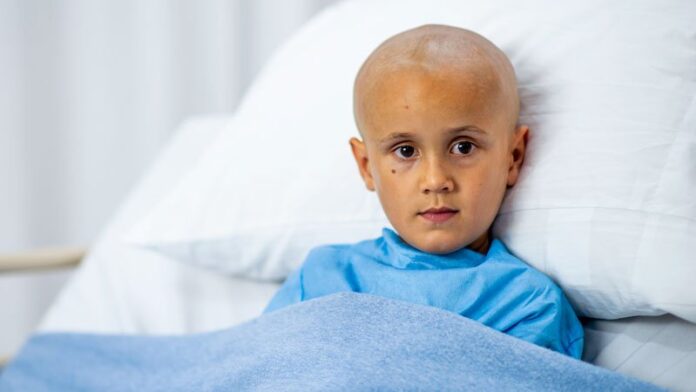[ad_1]
For now at least, total body irradiation (TBI) plus etoposide remains the conditioning regimen of choice for children undergoing allogeneic hematopoietic stem cell transplant for acute lymphoblastic leukemia (ALL), according to an open-label phase 3 trial from Europe.
The investigators sought to answer a question many physicians have raised: with improvements in human leukocyte antigen typing, better graft-vs-host disease prophylaxis, and other advances, can myeloablative chemotherapy conditioning replace TBI, which is more toxic?
The downstream effects of TBI can include secondary malignancies and cataracts, as well as impaired growth and impaired gonadal and cognitive function.
But the answer to that question is no, or at least, not yet.
The phase 3 trial included individuals with ALL who were 4 to 21 years of age at time of transplant. They were randomly assigned to receive either fractionated TBI at 12 Gy plus etoposide or chemotherapy based on a myeloablative regimen: fludarabine, thiotepa, and either busulfan or treosulfan.
The trial was stopped after 413 patients had undergone randomization ― quite a bit short of the 1000-patient goal. The trial was terminated because TBI proved clearly superior on an interim analysis at a median follow-up of 2.1 years.
The results showed that 72% of the TBI group ― but only 51% of the chemotherapy arm ― were relapse free at 2 years with no graft-vs-host disease (P = .0003).
The 2-year treatment-related mortality rate was 2% in the TBI group but 9% with chemotherapy conditioning (P = .03).
The study was published February 1 in the Journal of Clinical Oncology.
“We recommend TBI plus etoposide conditioning for patients >4 years old with high-risk ALL undergoing allogeneic HSCT [hematopoietic stem cell transplant],” they conclude. The investigators were led by Christina Peters, MD, a pediatrics professor at the St. Anna Children’s Cancer Research Institute, Vienna, Austria.
The benefits of TBI held on multivariate analysis and across subgroups, including children in their first and second remissions and among those with high-risk cytogenetics. Relapse risk factors, such as age at transplant, leukemic phenotype, and molecular aberrations, did not significantly affect outcomes, the authors report.
Given that relapses plateaued with TBI at 2.5 years but were still on the upswing for patients who underwent chemoconditioning, “it is unlikely that secondary malignancies after TBI could jeopardize the survival advantage,” they write.
“So does this mean that the HCT [hematopoietic cell transplant] community is forever chained to TBI as a standard of care? Certainly, it means that without very sound rationale to deviate, a TBI-based preparative regimen is the preferred therapy at present,” comments Michael Pulsipher, MD, head of blood and marrow transplantation at Children’s Hospital Los Angeles, in an accompanying editorial.
However, “there are approaches under study currently that may define patients who do not need TBI for high rates of cure,” he suggests. Those approaches include selecting patients with the deepest remissions and using KIR-favorable haplotype to harness natural killer cell activity.
“In our new world of chimeric antigen receptor T-cells and immunotherapies, surely we can find safer paths to success,” Pulsipher writes.
Surely we can find safer paths to success.
With regard to patient selection, the investigators note that a recent review that included more than 3000 children with ALL found no overall survival benefit with TBI vs chemoconditioning for patients in first complete remission (CR1) but worse outcomes with chemoconditioning among patients in CR2. “A similar trend was observed in our subgroup analyses; however, our study was not powered to assess statistical significance in a sample size of 413 patients,” they write.
Minimal residual disease (MRD) did not influence survival outcomes, probably because the investigators were aggressive in inducing deep remission in their patients before transplant, so for most patients, MRD was undetectable or very low beforehand.
The study was funded by Amgen, Jazz Pharmaceuticals, Neovii, Medac, and others. Peters and coauthors and Pulsipher have disclosed numerous ties with those and/or other companies.
J Clin Oncol. Published online February 1, 2021. Full text
M. Alexander Otto is a physician assistant with a master’s degree in medical science, and an award-winning medical journalist who has worked for several major news outlets before joining Medscape, including McClatchy and Bloomberg. He is an MIT Knight Science Journalism fellow. Email: [email protected].
For more from Medscape Oncology, join us on Twitter and Facebook.
[ad_2]
Source link












